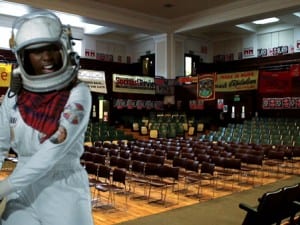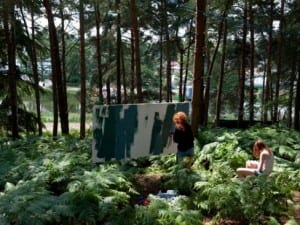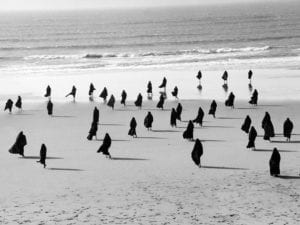The digital landscape has altered how and when we experience cinema. In autumn 2010 the Abandon Normal Devices Festival opened to explore these junctures in more detail.
Today there is a distinct intersection between art and cinema, which is evolving into a new paradigm within the digital landscape. The delivery systems have changed, it’s no longer the multiplex that’s in charge of when, where and how films are screened, rather there’s a burgeoning democratisation of film culture. At a new frontier, cinema, in the traditional sense, is now being experienced in innovative and stimulating ways.
In the last issue, we reported the Secret Cinema project, where participants not only watch films, but experience live cinema. There are more options available for viewers and artists’ films are extending beyond the context of the gallery, for example, including the cross-over film, My Winnipeg (2007) by Guy Maddin or more recently Yorgos Lanthimos’ Dogtooth (2009). Not only is cinema being encountered in new ways, but audiences are starting to question the overall experience of what it means to watch a film. Even the rituals of the film festival are changing, expanding the trajectory of cinematic practice. With this in mind, cinema becomes more than a ticket and box of popcorn.
This October, the Abandon Normal Devices (AND) Festival of New Cinema and Digital Culture opens in Manchester. Formed in the Northwest, AND is a collaboration between FACT (Foundation for Art and Creative Technology) in Liverpool, Cornerhouse in Manchester and folly in Lancaster. After its inauguration in Liverpool last year and plaudits from The Guardian and Little White Lies, the festival is a catalyst for production and experimentation. This year’s emphasis is on explorations of identity, behaviour and systems, which define who and what we are. The festival invites a host of international cross-platform artists and filmmakers to investigate what normal devices are and asks, how might we abandon them?
AND will travel between Liverpool and Manchester on alternate years with an extended programme in Cumbria, Lancashire and Cheshire. Could this be the beginning of the Northwest Film and Digital Culture Festival? Conceived from a flipchart of “doom”, the organisers’ decided to strategize using Brian Eno and Peter Schmidt’s, Oblique Strategies (1975). Oblique Strategies is a project that consists of a set of cards with a series of instructions and self-imposed rules to enable people to change their creative process and their method of working. Festival Manger, Gabrielle Jenks, explains: “The idea is, if you were creatively stuck, you could pick up a card and it would say: ‘Ask your body’ or ‘Say it in the simplest terms as possible.’” Fortunately for the organisers, they selected the card “Abandon Normal Instruments”, which inspired the festival’s vision, but also encouraged an “idea for filmmakers, producers and writers to abandon their normal processes and create something different or propose a striking perspective on how to move forward and change the normal routine.”
The 2010 edition of Abandon Normal Devices features brand new commissions from internationally renowned artists, filmmakers and cultural provocateurs. The programme includes a special collaboration and exhibition with artist Phil Collins for his new work, marxism today, the UK premiere of Gillian Wearing’s first feature length film Self-Made, human vacuum packing from controversial artist Lawrence Malstaff, and UnSpooling: Artists & Cinema, a gallery based exhibition of work from artists and filmmakers, which explores the materiality of film and the history of cinema. There are even plans to screen a 570 minute film, challenging the framework of how you show films by length, and how you push people’s concentration and invite them to slow down.
The main premise behind this year’s festival is to create a discursive platform that will be centred on debate around new cinema, particularly with reference to looking at its definitions. Even the title of the festival is curious – organisers are requesting attendees to abandon their normal devices. How can this be achieved? In a rigid world of protocol and expectations, this seemingly painless concept is difficult to put into practice. However, Jenks is pragmatic: “We want to take risks, it’s an opportunity for three organisations that are already producing interesting work to push boundaries further through the festival, but there is a level of responsibility, because we can programme work that we’d never be able to do within the context of running a venue. We want to galvanise energy over a period of time, and get audiences talking around the bar, push artists in new directions, and put films in unusual spaces.”
One of the main festival highlights is the premiere of Self Made, co-written by Turner-prize winning artist Gillian Wearing and playwright Leo Butler. Based on an idea by Wearing, the film follows 12 participants as they discover their invented personas through a method workshop. Filmed on location in Newcastle it follows newspaper and Job Centre adverts being placed that simply asked members of the public: “If you were to play a part in a film, would you be yourself or a fictional character?” From those who replied several were cast to develop their characterisation and eventually appeared in the film. Wearing explains: “We are currently living through uncertain times that are forcing many people to question and redefine established notions of identity. In a world in which CCTV, reality television and ‘fictionalised’ documentary makes us all into performers, reality and fiction are rapidly becoming interchangeable commodities. Self Made will show how it is possible to blur the divisions of reality and fiction and expose how real people see their own lives as a movie. Are we all playing a role, consciously or unconsciously?”
When heroes are reality TV stars and a breaking news story is a celebrity break-up, Wearing’s film is a profound analysis on society, and the norms and social mores of the day. Jenks comments: “Wearing works with personal identity and the media’s identity, while critiquing television, and how that determines the way we perceive ourselves. The decline of the class system gave us a need to align ourselves with another narrative. We were able to categorise other people and ourselves but we no longer can, we have to build a story around ourselves. Self Made is evidence of this – if you want to be in a film who would you be?”
This year’s programme will also consist of sensory experiences through Lawrence Malstaff’s highly provocative, Shrink. Consisting of two large, transparent plastic sheets, volunteers will be wrapped, while a device gradually sucks out the air leaving their bodies vacuum-packed and vertically suspended. Shrink addresses all five senses, but without giving priority to the communication-technologies that are today still limited to the audio-visual.
Another hot ticket on this year’s programme is UnSpooling: Artists & Cinema (curated by Andrew Bracey and Dave Griffiths), which questions our expectations about the production, display and experience of cinema. The project features innovative painting, drawing, film and video from the last decade, plus newly commissioned performance, installation and cinematic sculpture, as well as architectural and street interventions. Together the work explores a field where cinema exists, as an experience, language, history, theory and artefact.
With a dynamic and probing programme, AND will incite new experiences for cinema-goers and by “looking at the journeys we’ve already been on, artists are inspired by this idea of abandoning normal devices.” Unpacking this idea further, Jenks wants to dissect normality: “We started to look into what normality was and we couldn’t separate it from identity. It’s something that we either try to rebel against or it’s seen to be reinforcing a status quo. Statistically there’s a dataset that offers a benchmark on how ‘normal’ you are by asking questions such as, how many cars you’ve owned; it’s through numbers that you can determine how ‘normal’ you are, and how identity is linked to normality, behaviour and systems.” But with this comes accountability: “There is a balance between offering striking perspectives and asking hard-line questions about why we behave the way we do. You have to be careful about how you do that, and the responsibility that you have when you want to push things quite so far.”
In 2010 AND offered a heady mix, curating a subversive programme that challenged perceptions, notions of identity, and engaged within the broadest context of digital culture. AND examined the process as much as the product, which in its own right, made this a festival of its day. www.andfestival.org.uk.
Cherie Federico





